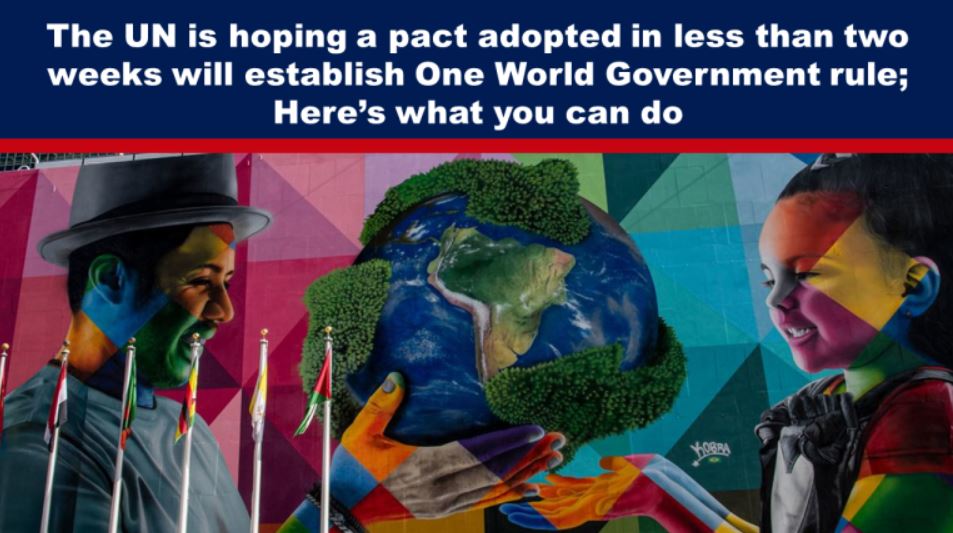Through pacts the United Nations is hoping will be adopted in less than two weeks at the ‘Summit of the Future’, the UN is establishing a One World Government through the monopoly of national sovereignty.
However, there is no lawful authorisation for delegates to vote on the ‘Pact for the Future’, ‘Declaration for Future Generations’, ‘Global Digital Compact’ and António Guterres’ ‘Our Common Agenda’.
Serve this notice and declaration on the United Nations, your government representative to the United Nations and your government. Demand that your voice is heard before the exclusive Summit of The Future takes place from 20 to 23 September 2024.
The Summit of the Future is a high-level United Nations (“UN”) event scheduled for 22 and 23 September 2024, with “action days” being held on 20 and 21 September. The Summit will culminate in the adoption of the ‘Pact for the Future’.
Leaders from UN Member States will attend the Summit to reaffirm existing commitments, including the Sustainable Development Goals (“SDGs”) and the UN Charter, and move towards a “reinvigorated multilateral” system.
It is expected that other participants of the Summit will include representatives from various UN agencies, selected non-governmental organisations, selected private sector businesses and industries, selected representatives from universities and research institutions, selected municipalities, regional governments and local authorities, and the dystopian and nefarious sounding “representatives of future generations.”
There are two chapters in the draft Pact of the Future: a chapter on science, technology, innovation and digital cooperation, and a chapter on youth and future generations. The draft chapter on youth and future generations builds on the 1997 ‘UNESCO Declaration on Responsibilities towards Future Generations’ and takes the perspective on future generations further.
Read more: An Overview of the Pact for the Future, UNESCO, 2 February 2024
Future generations are defined by the ‘Declaration on Future Generations’ – the UN also refers to this document as ‘Declaration for Future Generations’ which is annexed to the Pact for the Future – as “all those generations that do not yet exist, and who will inherit this planet.”
By definition, the future generations will always “not yet exist,” ad infinitum. In 100 years, the future generations at that time will not yet exist. In 1,000 years, the same; future generations will not yet exist. The “future generations” concept is simply a poor excuse for a selected few – “representatives of future generations” – to make rules that they expect billions of people who do exist to obey, ad infinitum.
Further reading: UN Pact for the Future: All our lives will be dictated to by a selected UN envoy to represent generations not yet born
Who are the “representatives of future generations,” how many of them are there and who selects them? As is usual for the UN and its agencies, the document that member states are expected to adopt is sparse of such important details; perhaps it is because they don’t want member states to know who the few that are selected, or self-selected, to rule the world are.
The only details we’re given who the selected few rulers are is in The Declaration on Future Generations. It merely states that member states agree to the UN Secretary-General’s proposal of the appointment of a “UN Special Envoy for Future Generations,” which we assume may play a crucial role once they have been appointed. But as far as negotiations and representation for future generations at the Summit are concerned, the World Future Council (“WFC”) plays a leading role, or so they claim:
The World Future Council is well placed to play a leading role in the Summit of the Future, having focussed on the rights of futures [sic] generations as its main task since its launch 15 years ago.
The WFC has long pleaded for Representatives/ Guardians of Future Generations to be installed at international, national and local levels, with authority to scrutinise and propose policies to uphold their interests, including the right to peace, intergenerational justice, and a healthy, sustainable environment.
From the very beginning the World Future Council is mainly involved in the preparations of the Summit and its preparatory process.
UN Summit of the Future – towards a global Pact for the Future, World Futures Council
It’s almost irrelevant who and how many are involved in the small clique dictating what people who do exist should do for people who do “not yet exist.” The concept of “future generations” dictating our lives alone, as with the entire Pact for the Future, is enough to outright reject it before it even gets to the stage of the UN appointing a “Special Envoy for Future Generations.”
To this end, Shabnam Palesa Mohamed has prepared a notice for anyone from any country to serve on their country’s UN representative ahead of the Summit. She has also included a list of permanent country representatives and observers to the United Nations so citizens can easily find who the notice should be served on. As Mohamed recommends, don’t forget to copy in your Member of Parliament or government representative. And since some local municipality and government representatives may be attending the Summit, or so it is claimed, perhaps copy them in too.
Break The Silence: UN Notice and Declaration on Public Participation
The following is summarised and paraphrased from the notice for serving on the UN representative and/or observers from your country. You can read and download the full notice either in the file attached above or on Mohamed’s Substack page HERE.
Mohamed’s document contains three notices in one:
- Notice of Urgent Declaration of Invalidity on the Summit of the Future, Pact for the Future, And Annexes due to lack of public knowledge, participation, and informed consent
- Notice of Urgent Statement of Dispute on the standing authority the United Nations is unlawfully appropriating to manage real or engineered emergencies, outlined in its ‘Common Agenda’
- Notice of Urgent Objection to a United Nations Declaration, a political declaration on pandemics, announced at the UNGA 78, which ignored the 11+ countries that broke the silence, in writing
She has organised the document into five sections:
- Rule of Law + International Law
- Summary and Call to Action
- Public Participation
- Dispute Resolution (This section includes the three notices mentioned above: the ‘Declaration of Invalidity’, the ‘Statement of Dispute’ and the ‘Objection to political declaration on pandemics’)
- Conclusion with Appeal
The UN system is intended to operate on the principle of the Rule of Law, as outlined in the UN’s own official documentation. The intention of this principle is to ensure transparency, accountability and respect for human rights in all UN activities and decision-making processes. Yet, during the covid event, the UN was fully aware of human rights abuses around the world. This includes draconian lockdowns, state violence, poverty and destructive social crisis.
Additionally, before any government can declare a state of emergency, it must show that the alleged public health crisis “threatens the life of the nation” according to specific criteria. These criteria were not met for covid; international law was knowingly violated.
Deepening the distrust in the UN is its inaction and silence against those who intimidated delegates at the 77th World Health Assembly into agreeing with amendments to the International Health Regulations 2005.
Due to a lack of comprehensive public participation relating to the UN Secretary-General’s ‘Our Common Agenda’ document and the ‘Pact for the Future’ – with its annexes the ‘Global Digital Compact’ and the ‘Declaration on Future Generations’ – We The People insist that the following are included in the discussions of and report on the Summit of the Future:
- our Declaration of Invalidity,
- our Statement of Dispute, and
- our Urgent Objection
We demand that both the Pact for the Future and Our Common Agenda be withdrawn at the upcoming Summit for the Future. Should this not happen, member state delegates, who answer to the people of the countries they represent, must reject these documents outright. They must not be intimidated for doing so, as was the case at the WHO’s World Health Assembly in May this year about International Health Regulations 2005.
Explainer: The UN operates a “silence procedure.” This is when a proposal or text is circulated among participants, often with a deadline for comments or amendments. If no objections are raised before the deadline, the text is considered adopted by all participants. If a participant still has fundamental issues with the text, they can “break the silence” by raising an objection before the deadline. This allows for further negotiations or revisions.
The notice prepared by Mohamed notes that the silence procedure on the Declaration on Future Generations has been broken. However, the UN has withheld which countries voiced objections to this Declaration. “Civil society has a right to know which countries have objected,” Mohamed’s notice states.
The United Nations faces legitimate criticism for consistently falling far short of legitimate expectations and demands that the UN documents and its staff have proclaimed. This includes ongoing secretive negotiations on the Pact for the Future and Our Common Agenda. There has been little to no meaningful public participation at the UN and member state level. There is therefore growing international resistance.
The UN also faces criticism for, inter alia, top-down approaches and political and economic influences.
In 2020, UN Secretary-General, António Guterres, issued a vision for human rights, titled ‘The Highest Aspiration: A Call to Action for Human Rights’. In it, “The ‘three P’s’: participation, protection and promotion” were highlighted. These undertakings have not been achieved by the UN. The UN has failed to uphold its commitments in general, and in particular, in relation to the Pact for the Future, the Declaration on Future Generations, the Global Digital Compact and Our Common Agenda.
The UN is fully aware that it is only a select group of civil society organisations that interact with the UN or that have a seat at the table. Even these organisations continue to complain about the lack of inclusion, transparency and respect afforded to them by the UN and its agencies, including the World Health Organisation (“WHO”) and the IMF.
Civil society non-governmental organisations (“NGOs”) have expressed discontent with the UN’s transparency and lack of inclusion, particularly in the accreditation process for NGOs seeking consultative status with the UN. Key issues include bias in the ECOSOC Committee, lack of transparency in decision-making, restrictive criteria and limited representation.
In September 2023 a letter was sent by 11 member state delegates to UN GA president Dennis Francis and UN Secretary-General Antonio Guterres. The member states were objecting to unilateral coercive measures and violations of human rights and international law relating to the adoption of a high level political declaration on pandemic prevention, preparedness and response.
The political declaration was being adopted using the “silence procedure.” Both WHO Director-General Adhanom Tedros Ghebreyesus and UN Secretary-General Antonio Guterres ignored this letter from the 11 member states and declared that all 193 member states of the United Nations had approved the political declaration on pandemic prevention, preparedness and response.
Through the Pact for the Future, Our Common Agenda and Emergency Platform, the UN is establishing a One World Government through the monopoly of national sovereignty.
There is no lawful authorisation to vote on the Pact for the Future, Declaration for Future Generations, Global Digital Compact, and Our Common Agenda.
Featured image: Planning ahead: Five things to know about the UN’s landmark Summit of the Future, United Nations. This is an image taken from the UN’s webpage for the Summit of the Future. Notice the snakes, three heads, wrapping around the world!
Source: https://expose-news.com/2024/09/11/un-is-hoping-to-establish-one-world-government/
Bitchute: https://www.bitchute.com/channel/YBM3rvf5ydDM/
Telegram: https://t.me/Hopegirl587
EMF Protection Products: www.ftwproject.com
QEG Clean Energy Academy: www.cleanenergyacademy.com
Forbidden Tech Book: www.forbiddentech.website













